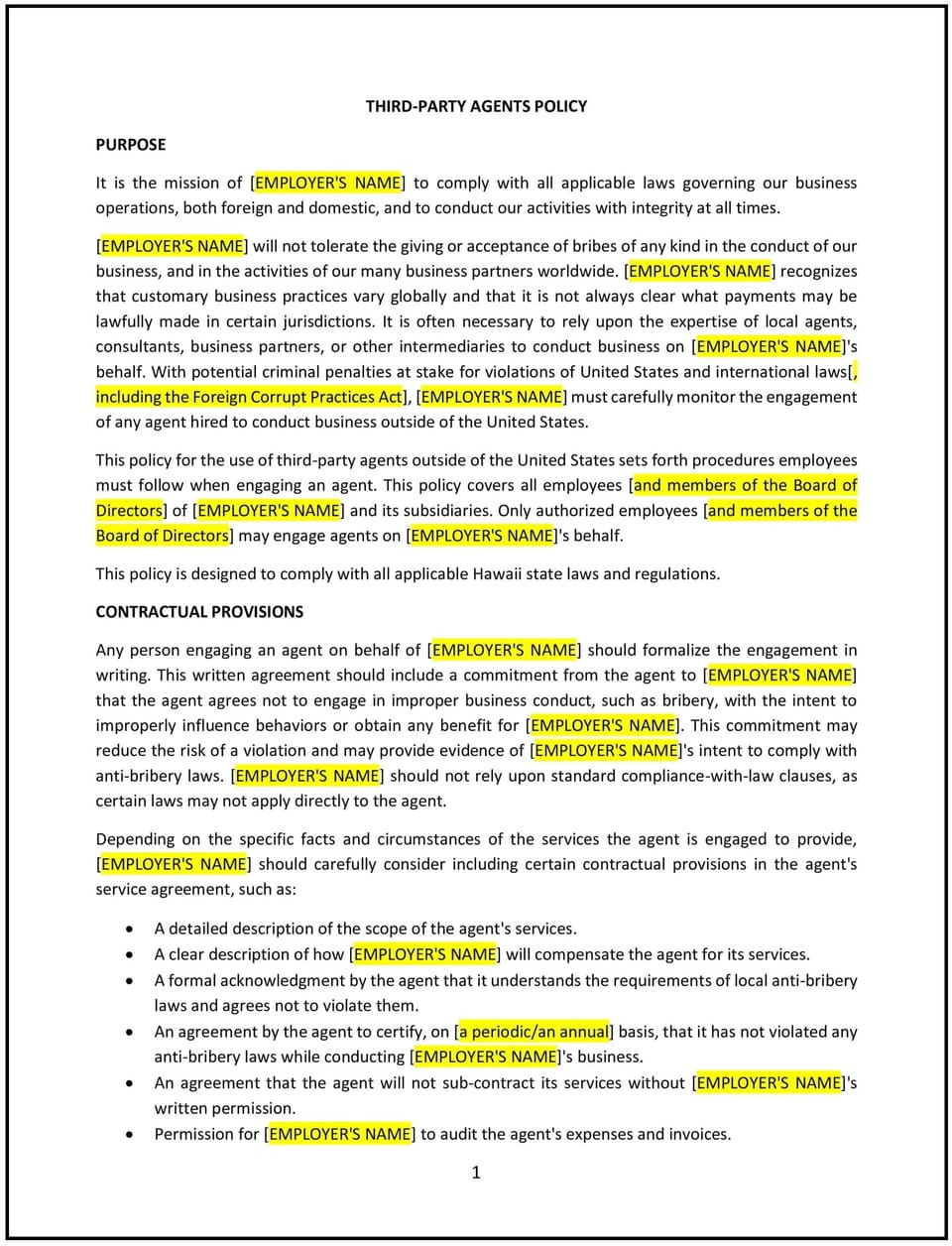Third-party agents policy (Hawaii): Free template

Third-party agents policy (Hawaiʻi)
A third-party agents policy helps Hawaiʻi businesses establish clear guidelines for engaging and managing external partners, such as contractors, vendors, or consultants. This policy outlines procedures for selecting, onboarding, and overseeing third-party agents, while addressing Hawaiʻi’s unique business environment and cultural values. It is designed to promote accountability, transparency, and effective collaboration with external partners.
By implementing this policy, businesses in Hawaiʻi can strengthen relationships with third-party agents, mitigate risks, and ensure alignment with business goals and values.
How to use this third-party agents policy (Hawaiʻi)
- Define third-party agents: Clearly explain who qualifies as a third-party agent, such as contractors, vendors, consultants, or service providers.
- Establish selection criteria: Outline the process for selecting third-party agents, including evaluating their qualifications, reputation, and alignment with business values.
- Set expectations: Provide guidelines for the roles, responsibilities, and performance standards expected of third-party agents.
- Address contracts and agreements: Specify the requirements for formal contracts, including scope of work, payment terms, confidentiality, and termination clauses.
- Monitor performance: Describe how third-party agents’ performance will be evaluated, including key metrics, reporting, and feedback processes.
- Ensure data security: Provide guidelines for protecting sensitive information shared with third-party agents, such as using non-disclosure agreements (NDAs) or secure communication tools.
- Communicate the policy: Share the policy with relevant stakeholders, including internal teams and third-party agents, to ensure clarity and alignment.
- Train employees: Educate employees on the policy’s guidelines, including how to manage relationships with third-party agents effectively.
- Review and update the policy: Periodically assess the policy’s effectiveness and make adjustments as needed to reflect changes in business needs or partnerships.
Benefits of using this third-party agents policy (Hawaiʻi)
This policy offers several advantages for Hawaiʻi businesses:
- Promotes accountability: Clear guidelines help ensure third-party agents understand their roles and responsibilities, reducing the risk of misunderstandings.
- Mitigates risks: Structured procedures for selecting and managing third-party agents minimize risks related to performance, data security, or legal issues.
- Enhances transparency: A formal policy fosters trust and transparency in relationships with external partners.
- Supports compliance: The policy helps businesses align with applicable laws and regulations, such as data privacy and contract requirements.
- Improves efficiency: Streamlined processes for onboarding and managing third-party agents save time and resources.
- Strengthens partnerships: A clear and fair policy demonstrates the business’s commitment to building strong, collaborative relationships with third-party agents.
- Aligns with business values: The policy ensures third-party agents reflect the business’s values and contribute to its goals.
Tips for using this third-party agents policy (Hawaiʻi)
- Communicate the policy effectively: Share the policy with relevant stakeholders, including internal teams and third-party agents, to ensure clarity and alignment.
- Set clear expectations: Clearly outline roles, responsibilities, and performance standards for third-party agents to avoid misunderstandings.
- Use formal contracts: Ensure all agreements with third-party agents are documented in writing, including scope of work, payment terms, and confidentiality clauses.
- Monitor performance: Regularly evaluate third-party agents’ performance and provide feedback to address any issues promptly.
- Prioritize data security: Use non-disclosure agreements (NDAs) and secure communication tools to protect sensitive information shared with third-party agents.
- Build relationships: Foster open communication and collaboration with third-party agents to strengthen partnerships and achieve mutual goals.
- Review the policy periodically: Update the policy as needed to reflect changes in business needs, partnerships, or legal requirements.
Q: Why should Hawaiʻi businesses adopt a third-party agents policy?
A: Businesses should adopt this policy to promote accountability, mitigate risks, and ensure effective collaboration with external partners.
Q: What types of third-party agents are covered under the policy?
A: The policy applies to contractors, vendors, consultants, service providers, and other external partners engaged by the business.
Q: How should businesses select third-party agents?
A: Businesses should evaluate third-party agents based on their qualifications, reputation, alignment with business values, and ability to meet performance standards.
Q: What should be included in contracts with third-party agents?
A: Contracts should include scope of work, payment terms, confidentiality clauses, termination conditions, and any other relevant terms.
Q: How should businesses monitor third-party agents’ performance?
A: Businesses should establish key metrics, require regular reporting, and provide feedback to evaluate performance and address any issues.
Q: How can businesses protect sensitive information shared with third-party agents?
A: Businesses should use non-disclosure agreements (NDAs), secure communication tools, and data security guidelines to protect sensitive information.
Q: How often should businesses review the policy?
A: Businesses should review the policy annually or as needed to reflect changes in business needs, partnerships, or legal requirements.
This article contains general legal information and does not contain legal advice. Cobrief is not a law firm or a substitute for an attorney or law firm. The law is complex and changes often. For legal advice, please ask a lawyer.


